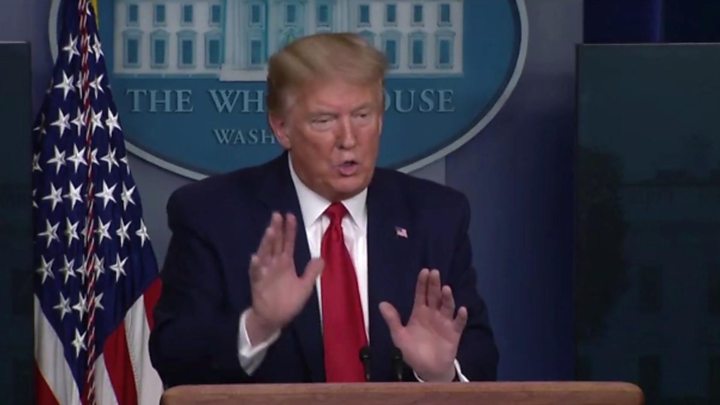
Democratic governors have asked the White House to urge Americans to heed stay-at-home orders amid anti-lockdown protests stoked by the president.
Michigan Governor Gretchen Whitmer said the "phenomenon was nationwide" and asked for "help on the national level".
President Donald Trump has been accused of inciting insurrection after championing the demonstrators, while telling governors they were in charge.
The plea comes amid 782,159 confirmed US Covid-19 cases and 41,816 deaths.
The protesters - who say the Covid-19 restrictions are draconian - are largely conservative and pro-Trump.
As one militia leader in Illinois put it to the BBC: "Reopen my state or we will reopen it ourselves."
The demonstrations have taken place in more than a dozen states from coast to coast, varying in size from a few dozen protesters to more than 2,000.
What did the governors say?
Ms Whitmer, a Democrat whose state has seen one of the largest anti-lockdown protests, told the White House during Monday's call she knew citizens were "frustrated" and called protesting a "wonderful American tradition".
"But it's just so dangerous to do that," she said, noting the fear of Covid-19 cases spiking in less-affected regions of her state, which has the third-highest infection rate in the nation.
Ms Whitmer said having the federal government "reiterate the importance of staying home until we get these numbers down... would be incredibly appreciated".
North Carolina Governor Roy Cooper, also a Democrat, echoed the same, requesting the Trump administration "let the public know that it is important for us to reach these minimum thresholds, before we began easing restrictions".
Vice-President Mike Pence, head of the coronavirus task force, promised the governors the administration would do so.
"We will make a point today and going forward to continue to reiterate that," Mr Pence said.
What has President Trump said?
The Republican president has expressed his support of the protesters in recent days, even as state governors say they are following White House guidance for safely reopening in phases.
Mr Trump - who faces an election in November - last week tweeted in all capital letters for several states to be liberated.
At Sunday's coronavirus briefing he said those protesting against their governors' social distancing measures were "great people".
"Their life was taken away from them," he said. "These people love our country, they want to get back to work."
Mr Trump previously insisted the presidency had power over state governors to rule when lockdown restrictions should be lifted.
He backed down after it was widely pointed out that the US Constitution grants states the power over public order and safety.
But as Monday's development makes clear, the White House can bring considerable political pressure to bear on governors, not to mention the influence of state business lobbies, legislatures and voters.
What states are easing restrictions?
On Monday governors in three southern states - Georgia, Tennessee and South Carolina - became the latest to announce plans to ease their coronavirus lockdowns.
Georgia's governor said restaurants, hair salons, gyms, bowling alleys and some cinemas would be allowed to reopen on Friday.
Tennessee said by 1 May the "vast majority of businesses" would be allowed to reopen.
South Carolina's governor has allowed people to return to beaches starting on Tuesday and non-essential retail businesses to reopen.
Other states that are easing lockdown rules include Minnesota, Texas, Vermont, Ohio, Idaho, Florida, North Dakota, Montana, New York, Connecticut and New Jersey. BBC